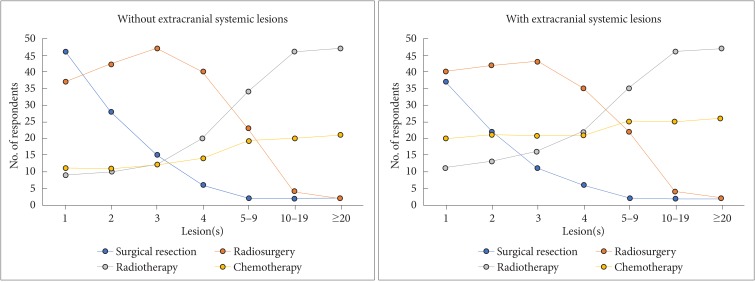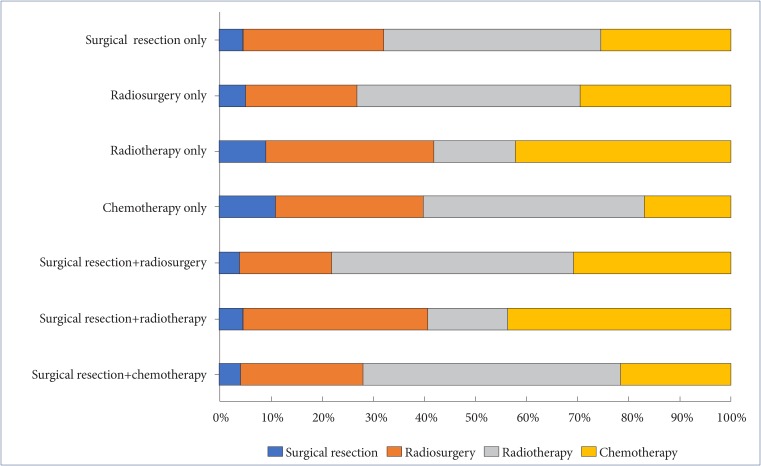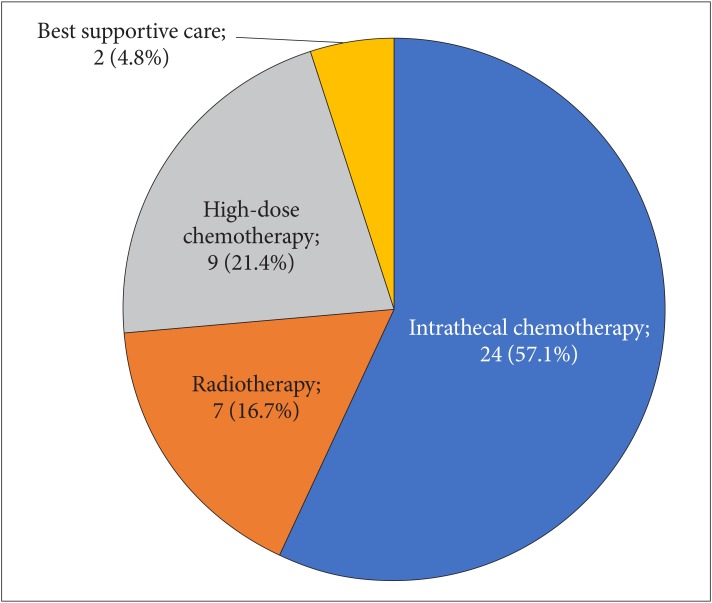Brain Tumor Res Treat.
2020 Apr;8(1):20-28. 10.14791/btrt.2020.8.e7.
A National Consensus Survey for Current Practicein Brain Tumor Management III: Brain Metastasis andPrimary Central Nervous System Lymphoma
- Affiliations
-
- 1Department of Neurosurgery, Gyeongsang National University Changwon Hospital, Gyeongsang National University School of Medicine, Changwon, Korea
- 2Department of Radiology and Research Institute of Radiology, Asan Medical Center, University of Ulsan College of Medicine, Seoul, Korea
- 3Department of Neurosurgery, Chungnam National University Hospital, Chungnam National University School of Medicine, Daejeon, Korea
- 4Department of Neurosurgery, International St. Mary’s Hospital, Catholic Kwandong University, Incheon, Korea
- 5Department of Neurology, Rare Disease Center, Seoul National University Hospital, Seoul National University College of Medicine, Seoul, Korea
- 6Department of Neurosurgery, Incheon St. Mary’s Hospital, College of Medicine, The Catholic University of Korea, Incheon, Korea
- 7Department of Pathology, Severance Hospital, Yonsei University College of Medicine, Seoul, Korea
- 8Department of Neurosurgery, St. Vincent’s Hospital, College of Medicine, The Catholic University of Korea, Suwon, Korea
- 9Division of Neurooncology and Department of Neurosurgery, Samsung Changwon Hospital, Sungkyunkwan University School of Medicine, Changwon, Korea
- 10Department of Neurosurgery, Chungbuk National University Hospital, Chungbuk National University College of Medicine, Cheongju, Korea
- 11Department of Neurosurgery, Seoul St. Mary’s Hospital, College of Medicine, The Catholic University of Korea, Seoul, Korea
- 12Department of Radiation Oncology, Yonsei Cancer Center, Yonsei University College of Medicine, Seoul, Korea
- 13Department of Neurosurgery, Yeungnam University Hospital, Yeungnam University College of Medicine, Daegu, Korea
- 14Department of Neurosurgery, Dong-A University Hospital, Dong-A University College of Medicine, Busan, Korea
- 15Department of Radiation Oncology, Seoul St. Mary’s Hospital, College of Medicine, The Catholic University of Korea, Seoul, Korea
- 16Department of Radiation Oncology, SMG-SNU Boramae Medical Center, Seoul National University College of Medicine, Seoul, Korea
- 17Division of Hematology/Oncology, Department of Medicine, Samsung Medical Center, Sungkyunkwan University School of Medicine, Seoul, Korea
- 18Department of Radiation Oncology, Samsung Medical Center, Sungkyunkwan University School of Medicine, Seoul, Korea
- 19Department of Radiation Oncology, CHA Bundang Medical Center, CHA University School of Medicine, Seongnam, Korea
- 20Department of Neurosurgery, Severance Hospital, Yonsei University College of Medicine, Seoul, Korea
- 21Department of Neurosurgery, Hanyang University Guri Hospital, Hanyang University College of Medicine, Guri, Korea
- 22Department of Neurosurgery, Kangbuk Samsung Hospital, Sungkyunkwan University School of Medicine, Seoul, Korea
- 23Department of Neurosurgery, Seoul National University Bundang Hospital, Seoul National University College of Medicine, Seongnam, Korea
- 24Department of Neurosurgery, Seoul National University Hospital, Seoul National University College of Medicine, Seoul, Korea
- 25Department of Hospital Pathology, Seoul St. Mary’s Hospital, College of Medicine, The Catholic University of Korea, Seoul, Korea
- 26Department of Cancer Control, Graduate School of Cancer Science and Policy, National Cancer Center, Goyang, Korea
- KMID: 2500118
- DOI: http://doi.org/10.14791/btrt.2020.8.e7
Abstract
- Background
: The Guideline Working Group of the Korean Society for Neuro-Oncology (KSNO) conducted the nationwide questionnaire survey for diverse queries facing to treat patients with brain tumor. As part III of the survey, the aim of this study is to evaluate the national patterns of clinical practice for patients with brain metastasis and primary central nervous system lymphoma (PCNSL).
Methods
: A web-based survey was sent to all members of the KSNO by email. The survey included 7 questions of brain metastasis and 5 questions of PCNSL, focused on the management strategies in specific situations. All questions were developed by consensus of the Guideline Working Group.
Results
" In the survey about brain metastasis, respondents preferred surgical resection with adjuvant treatment for patients with a surgically accessible single brain metastatic lesion less than 3 cm in size without extracranial systemic lesions. However, most respondents considered radiosurgery for surgically inaccessible lesions. As the preferred treatment of multiple brain metastases according to the number of brain lesions, respondents tended to choose radiotherapy with increasing number of lesions. Radiosurgery was mostly chosen for the brain metastases of less than or equal to 4. In the survey about PCNSL, a half of respondents choose high-dose methotrexate-based polychemotherapy as the first-line induction therapy for PCNSL. The consolidation and salvage therapy showed a little variation among respondents. For PCNSL patients with cerebrospinal fluid dissemination, intrathecal chemotherapy was most preferred.
Conclusion
: The survey demonstrates the prevailing clinical practice patterns for patients with brain metastasis and PCNSL among members of the KSNO. This information provides a point of reference for establishing a practical guideline in the management of brain metastasis and PCNSL.
Keyword
Figure
Reference
-
1. Gavrilovic IT, Posner JB. Brain metastases: epidemiology and pathophysiology. J Neurooncol. 2005; 75:5–14. PMID: 16215811.2. Nabors LB, Portnow J, Ammirati M, et al. NCCN Guidelines Insights: central nervous system cancers, version 1.2017. J Natl Compr Canc Netw. 2017; 15:1331–1345. PMID: 29118226.3. Tsao MN, Rades D, Wirth A, et al. International practice survey on the management of brain metastases: Third International Consensus Workshop on Palliative Radiotherapy and Symptom Control. Clin Oncol (R Coll Radiol). 2012; 24:e81–e92. PMID: 22794327.4. Villano JL, Koshy M, Shaikh H, Dolecek TA, McCarthy BJ. Age, gender, and racial differences in incidence and survival in primary CNS lymphoma. Br J Cancer. 2011; 105:1414–1418. PMID: 21915121.5. Grommes C, DeAngelis LM. Primary CNS lymphoma. J Clin Oncol. 2017; 35:2410–2418. PMID: 28640701.6. Kerbauy MN, Moraes FY, Lok BH, et al. Challenges and opportunities in primary CNS lymphoma: a systematic review. Radiother Oncol. 2017; 122:352–361. PMID: 28104300.7. Churilla TM, Chowdhury IH, Handorf E, et al. Comparison of local control of brain metastases with stereotactic radiosurgery vs surgical resection: a secondary analysis of a randomized clinical trial. JAMA Oncol. 2019; 5:243–247. PMID: 30419088.8. Pope WB. Brain metastases: neuroimaging. Handb Clin Neurol. 2018; 149:89–112. PMID: 29307364.9. Ferreri AJ, Blay JY, Reni M, et al. Prognostic scoring system for primary CNS lymphomas: the International Extranodal Lymphoma Study Group experience. J Clin Oncol. 2003; 21:266–272. PMID: 12525518.10. Hoang-Xuan K, Bessell E, Bromberg J, et al. Diagnosis and treatment of primary CNS lymphoma in immunocompetent patients: guidelines from the European Association for Neuro-Oncology. Lancet Oncol. 2015; 16:e322–e332. PMID: 26149884.11. Batchelor T, Carson K, O'Neill A, et al. Treatment of primary CNS lymphoma with methotrexate and deferred radiotherapy: a report of NABTT 96-07. J Clin Oncol. 2003; 21:1044–1049. PMID: 12637469.12. Guha-Thakurta N, Damek D, Pollack C, Hochberg FH. Intravenous methotrexate as initial treatment for primary central nervous system lymphoma: response to therapy and quality of life of patients. J Neurooncol. 1999; 43:259–268. PMID: 10563432.13. Herrlinger U, Schabet M, Brugger W, et al. German Cancer Society Neuro-Oncology Working Group NOA-03 multicenter trial of single-agent high-dose methotrexate for primary central nervous system lymphoma. Ann Neurol. 2002; 51:247–252. PMID: 11835382.14. Ferreri AJ, Cwynarski K, Pulczynski E, et al. Chemoimmunotherapy with methotrexate, cytarabine, thiotepa, and rituximab (MATRix regimen) in patients with primary CNS lymphoma: results of the first randomisation of the International Extranodal Lymphoma Study Group-32 (IELSG32) phase 2 trial. Lancet Haematol. 2016; 3:e217–e227. PMID: 27132696.15. Thiel E, Korfel A, Martus P, et al. High-dose methotrexate with or without whole brain radiotherapy for primary CNS lymphoma (G-PCNSL-SG-1): a phase 3, randomised, non-inferiority trial. Lancet Oncol. 2010; 11:1036–1047. PMID: 20970380.16. Herrlinger U, Schäfer N, Fimmers R, et al. Early whole brain radiotherapy in primary CNS lymphoma: negative impact on quality of life in the randomized G-PCNSL-SG1 trial. J Cancer Res Clin Oncol. 2017; 143:1815–1821. PMID: 28434043.17. Langner-Lemercier S, Houillier C, Soussain C, et al. Primary CNS lymphoma at first relapse/progression: characteristics, management, and outcome of 256 patients from the French LOC network. Neuro Oncol. 2016; 18:1297–1303. PMID: 26951382.18. Nguyen PL, Chakravarti A, Finkelstein DM, Hochberg FH, Batchelor TT, Loeffler JS. Results of whole-brain radiation as salvage of methotrexate failure for immunocompetent patients with primary CNS lymphoma. J Clin Oncol. 2005; 23:1507–1513. PMID: 15735126.19. Plotkin SR, Betensky RA, Hochberg FH, et al. Treatment of relapsed central nervous system lymphoma with high-dose methotrexate. Clin Cancer Res. 2004; 10:5643–5646. PMID: 15355887.
- Full Text Links
- Actions
-
Cited
- CITED
-
- Close
- Share
- Similar articles
-
- The value of computerized axial tomography of the brain in children with central nervous system disorders
- Metastatic Neuroblastoma in the Brain Parenchyma: A Case Report
- Primary Central Nervous System Lymphoma in Organ Recipient
- Primary Non-Hodgkin ''s Lymphoma Involving the Third Ventricle: A Case Report
- Successful Salvage Treatment for Isolated Brain Parenchymal Relapse due to Diffuse Large B Cell Lymphoma





